外研版高中英语必修4 Module 1 Life in the future Period3 listening and grammar课件(共32张PPT)
文档属性
| 名称 | 外研版高中英语必修4 Module 1 Life in the future Period3 listening and grammar课件(共32张PPT) | 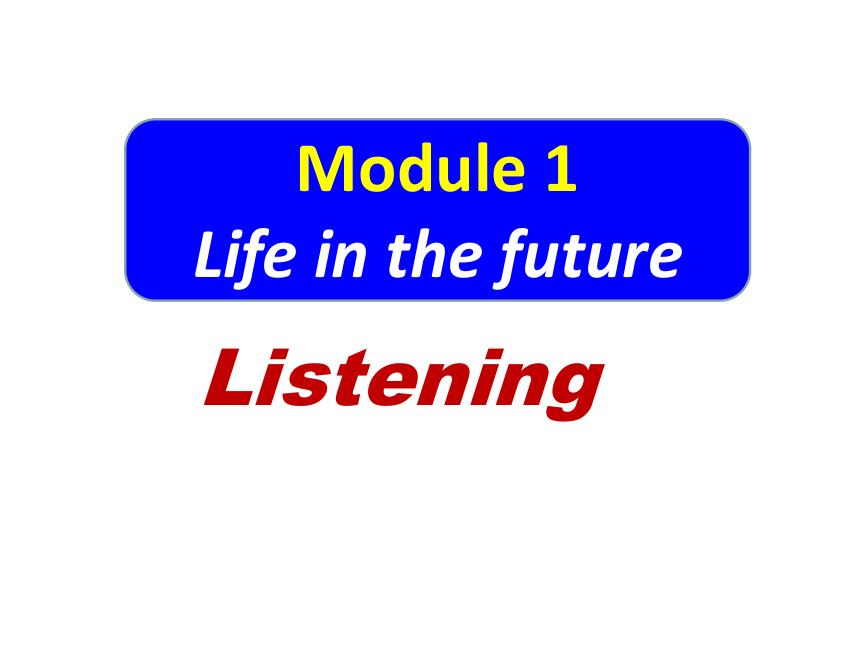 | |
| 格式 | zip | ||
| 文件大小 | 140.9KB | ||
| 资源类型 | 教案 | ||
| 版本资源 | 外研版 | ||
| 科目 | 英语 | ||
| 更新时间 | 2018-12-05 08:20:19 | ||
图片预览

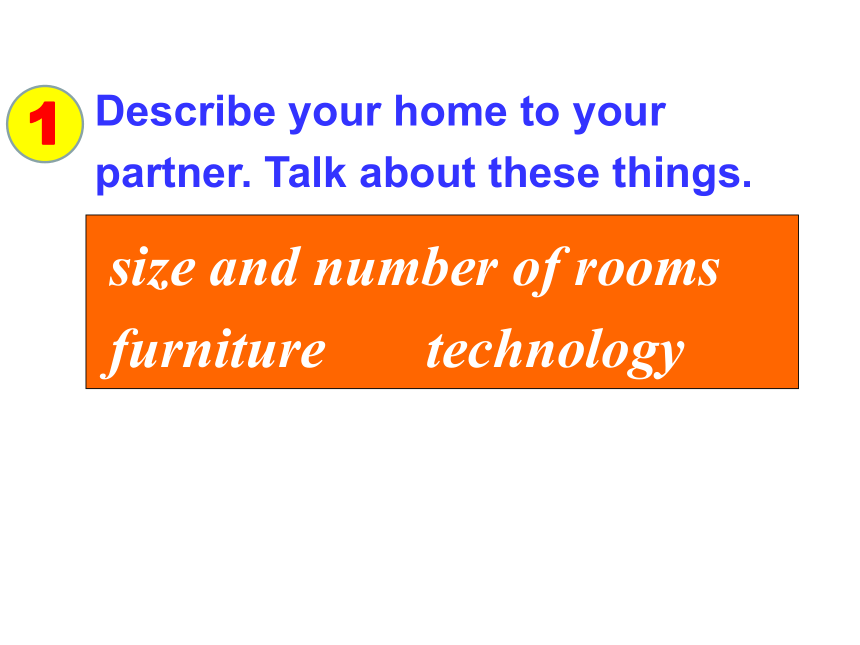
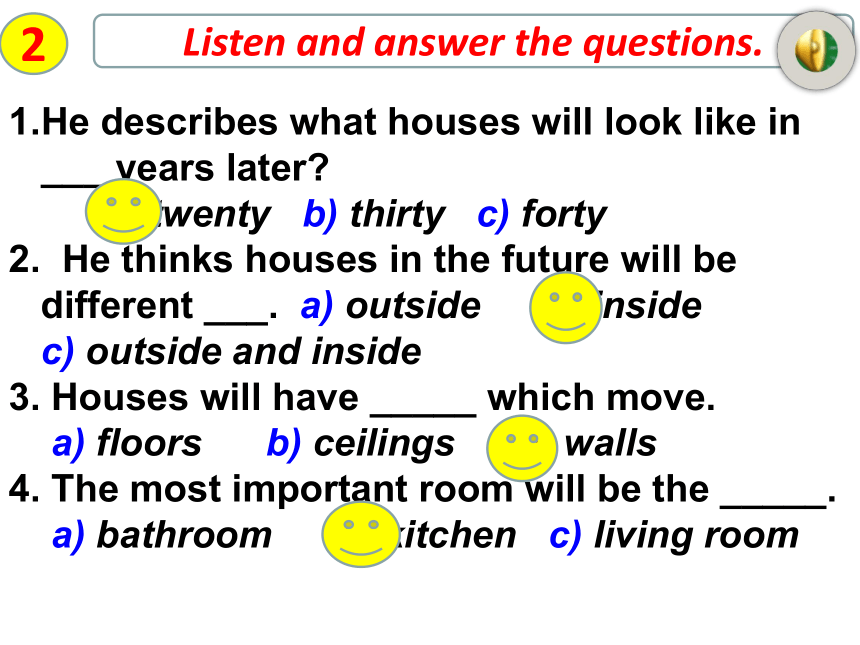
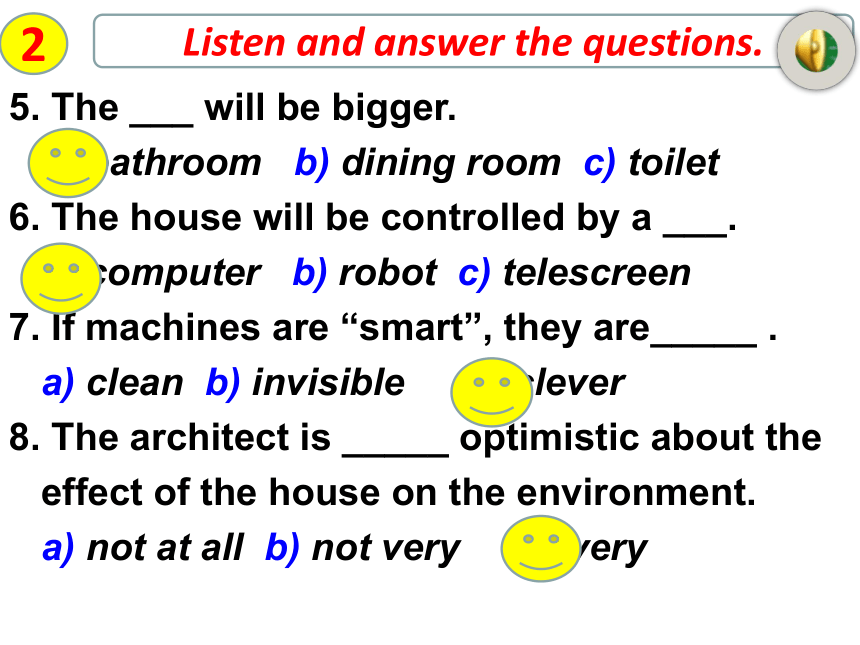
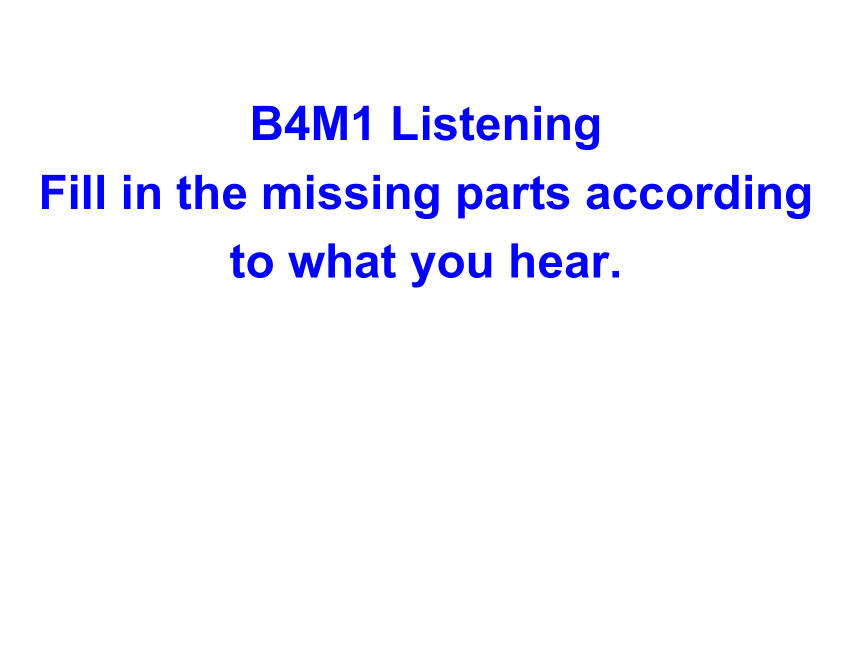
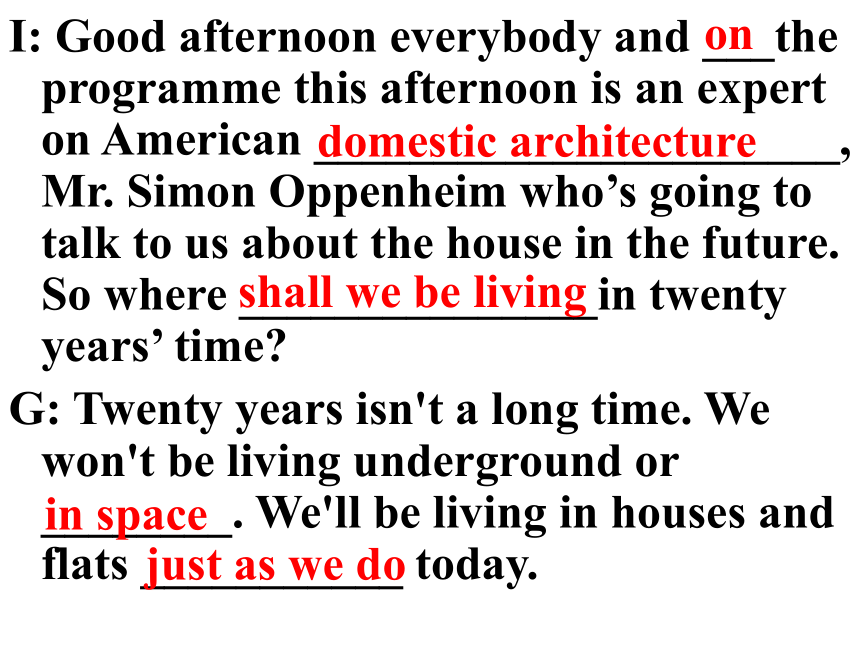
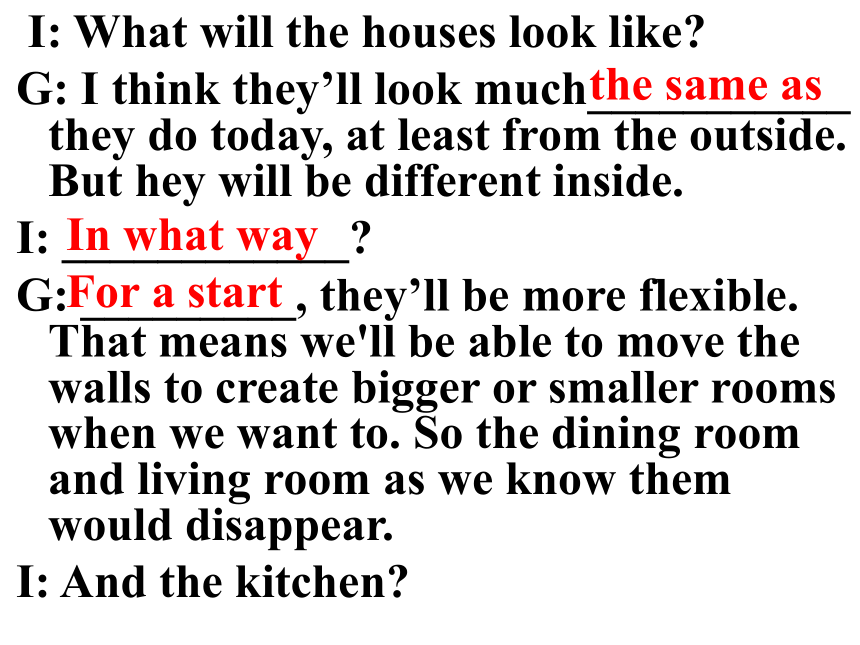
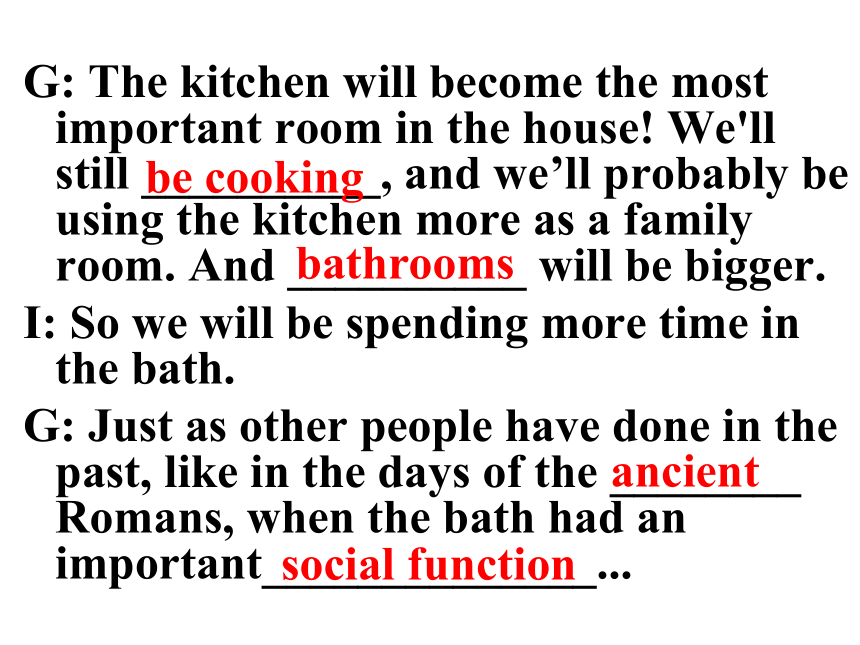
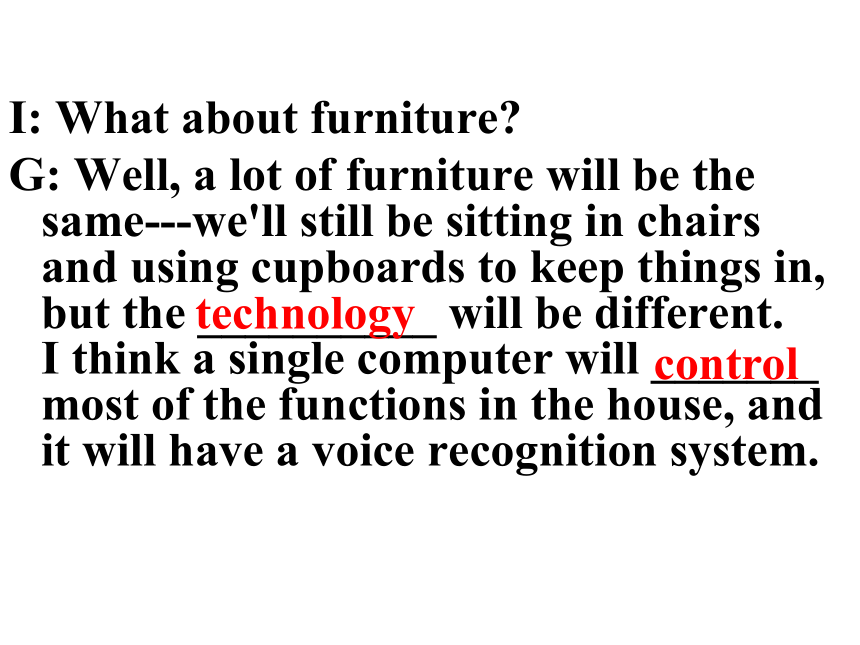
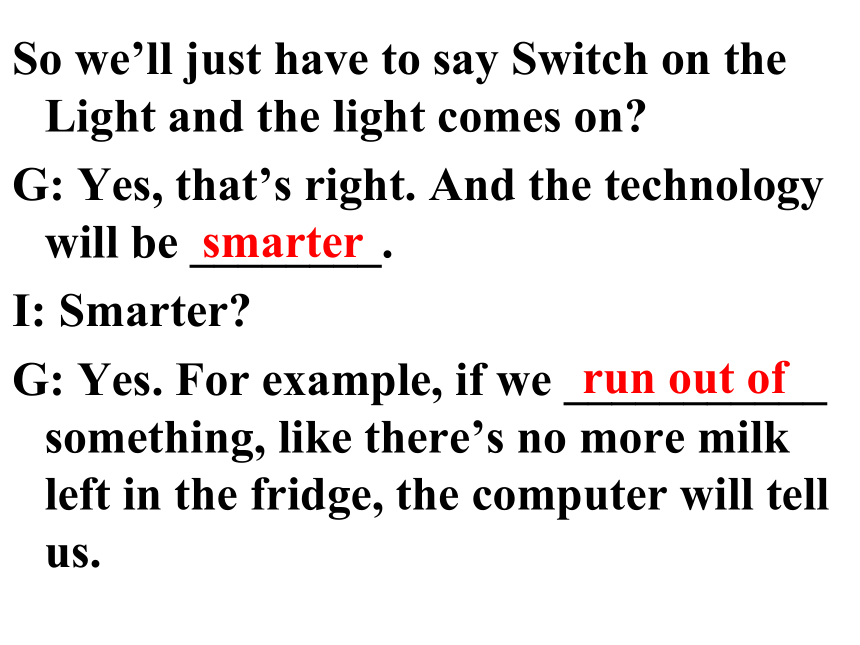

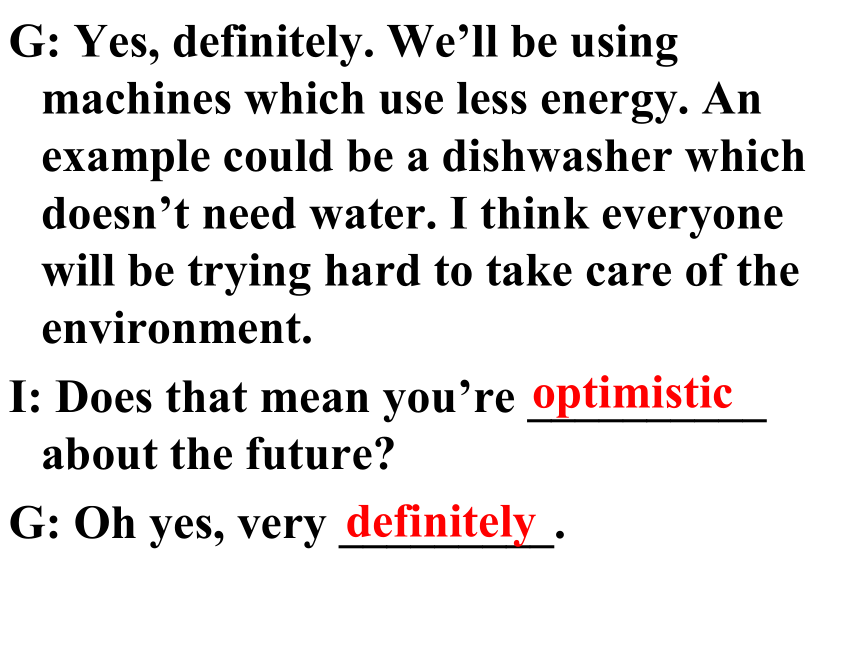
文档简介
课件32张PPT。Module 1
Life in the future ListeningDescribe your home to your
partner. Talk about these things. size and number of rooms
furniture technology1Listen and answer the questions.2He describes what houses will look like in ___ years later?
a) twenty b) thirty c) forty
2. He thinks houses in the future will be
different ___. a) outside b) inside
c) outside and inside
3. Houses will have _____ which move.
a) floors b) ceilings c) walls
4. The most important room will be the _____.
a) bathroom b) kitchen c) living roomListen and answer the questions.25. The ___ will be bigger. a) bathroom b) dining room c) toilet
6. The house will be controlled by a ___. a) computer b) robot c) telescreen
7. If machines are “smart”, they are_____ . a) clean b) invisible c) clever
8. The architect is _____ optimistic about the effect of the house on the environment. a) not at all b) not very c) veryB4M1 Listening Fill in the missing parts according to what you hear.I: Good afternoon everybody and ___the programme this afternoon is an expert on American ______________________, Mr. Simon Oppenheim who’s going to talk to us about the house in the future. So where _______________in twenty years’ time?
G: Twenty years isn't a long time. We won't be living underground or ________. We'll be living in houses and flats ___________ today.
ondomestic architectureshall we be livingin spacejust as we do I: What will the houses look like?
G: I think they’ll look much___________ they do today, at least from the outside. But hey will be different inside.
I: ____________?
G: _________, they’ll be more flexible. That means we'll be able to move the walls to create bigger or smaller rooms when we want to. So the dining room and living room as we know them would disappear.
I: And the kitchen?the same asIn what wayFor a start
G: The kitchen will become the most important room in the house! We'll still __________, and we’ll probably be using the kitchen more as a family room. And __________ will be bigger.
I: So we will be spending more time in the bath.
G: Just as other people have done in the past, like in the days of the ________ Romans, when the bath had an important______________...
be cookingbathroomsancientsocial fun_ction
I: What about furniture?
G: Well, a lot of furniture will be the same---we'll still be sitting in chairs and using cupboards to keep things in, but the __________ will be different. I think a single computer will _______ most of the functions in the house, and it will have a voice recognition system.technologycontrolSo we’ll just have to say Switch on the Light and the light comes on?
G: Yes, that’s right. And the technology will be ________.
I: Smarter?
G: Yes. For example, if we ___________ something, like there’s no more milk left in the fridge, the computer will tell us. smarterrun out of Maybe a shopping list would appear on a screen on the fridge. And the toilet will move higher or lower, _____________who uses it --- a child or an ______.
I:Will the houses of the future be ___________________?depending onadultenvironment friendlyG: Yes, definitely. We’ll be using machines which use less energy. An example could be a dishwasher which doesn’t need water. I think everyone will be trying hard to take care of the environment.
I: Does that mean you’re __________ about the future?
G: Oh yes, very _________.optimisticdefinitelyWhat could happen to the dining room and the living room?
How will people switch on the lights?
What will the toilet be able to do?
What will the dishwasher be able to do?They will disappear.The computer will do it.It will move higher or lower depending on who uses it.It will wash the dishes without water.Work in pairs. Try to remember what the architect says about4GrammarFunction Study:
What will the city of the future look like? No one knows for sure, and making predictions is a risky business. But one thing is certain – they are going to get bigger before they get smaller.Q: Which sentence talks about
1. a certain future?
2. a prediction?The second one.The first one.Function Q: 在英语中,用来表达将要发生的动作或事情有些什么表达方式?
Study:
They will come back next week.
The project will be completed in a month.
Conclusion:“Will+动词原形”表示在将来某个时间要发生的动作或存在的状态,常与表示将来的时间状语连用。有时也可用来表示揣测。如:The predictions will come true if technology continues to develop.Study:
Look! It’s going to rain.
They are going to stay for two days.
What are you going to do when you leave school?
Conclusion:“be going to +动词原形”表示打算在最近或将来要做的事;或表示根据已有的迹象推测很可能要发生的事情。Study:
When does the summer vacation begin?
My train leaves at ten o’clock.
The department store opens at nine tomorrow morning.
Conclusion:一般现在时可以表示按计划或时刻要发生的事;只限于某些瞬间动词,如arrive, begin, come, finish, get, go, leave, meet, return, sail, spend, start等。A. We arrive in Beijing on Tuesday at eight in the evening.
We’re visiting friends tonight.
Look – it’s going to rain!
I’m going to study engineering at university.
I won’t be here in twenty years.
These predictions will come true if technology continues to develop.Match the sentences with the meanings.2an intention
a future which you can’t “see” now
a timetable
an arrangement
a future time reference in a conditional sentence
a predictionNo one knows what the world will be like / is going to be like in the future.
What are you doing / are you going to do when you leave school?
What time does the plane arrive / will the plane arrive?
Look out! We’re having / We’re going to have an accident.Underline the most appropriate form of the verb3I can’t go out tonight, my cousin comes / is coming for dinner.
I’ll ring / I’m ringing you if I arrive early
My brother has decided. He’ll study / He’s going to study urban planning.
I think I go / I’ll go home now.
Underline the most appropriate form of the verb3GrammarThe future continuousGrammarRecall the sentences from the listening.
Where ____ we __________ (live) in 20 years’ time?
We ________________________(not, live) underground or in space.
We __________________ in houses and flats just as we do today.will be livingwon’t be livingwill be livingThe future continuous is formed with will be and the –ing form of the verb.
The negative form is won’t be and the –ing form of the verb.
The future continuous describes a situation which will be in progress at a given moment in the future.
The future continuous is used to refer to arrangements for the near future.
The future continuous is used to make predictions.Tick the true statements:1√√√√GrammarQ: 将来进行时的构成、用法?
Study:
At nine o’clock tonight I will be doing my homework.
In the year 3000 a lot of people will be living on space stations.
Conclusion:
将来进行时由“shall/will+be+现在分词”构成;表示将来某个时刻或某段时间内发生的动作,常与特定的将来时间状语连用。Q: 将来进行时还可以表示什么?
Study:
You needn’t cook supper, Mum. I shall be cooking dinner tonight.
Tom will be telling you about it this afternoon.表示已经决定或安排要发生的动作或事情表示预料中要发生的动作We ______________ probably ___________ the kitchen more as a family room.
We __________________ more time in the bath.
Everyone ___________________________ hard to take care of the environment.Complete the sentences:2willbe usingwill be spendingwill be trying At nine o’clock tonight I _____________ (do) my homework.
Don’t call me before seven. I ________________________ (get dressed).
They ____________________ (not work) next Thursday. It’s a public holiday.Complete the sentences with the verbs in brackets using the future continuous:3will be doingwill be getting dressedwon’t be working4. In the year 3000 a lot of people __________ (live) on space.
5. __________ you _________________ (stay) here next summer?
6. This time next year I _______________ (lie) on a beach.Complete the sentences with the verbs in brackets using the future continuous:3will be livingWill be stayingwill be lyingGrammar – speaking practice Tell your partner what you will be doing…
at six o’clock this evening
at half past eleven this evening
this time tomorrow
this time next yearPracticeComplete the sentences with an appropriate tense.
I _____________(have) my lesson in our classroom at 9 tomorrow morning.
-Would you like to go to our school to study next year?
-I ________________(study) in Australia next year.
3. - I thought I had asked you to post the letter.
- Oh, I’m sorry. I ______ (do) it right now.
will be havingam going to studywill doAssignmentRead the wordlist of Module 1.
Workbook Period 3 Module1
Life in the future ListeningDescribe your home to your
partner. Talk about these things. size and number of rooms
furniture technology1Listen and answer the questions.2He describes what houses will look like in ___ years later?
a) twenty b) thirty c) forty
2. He thinks houses in the future will be
different ___. a) outside b) inside
c) outside and inside
3. Houses will have _____ which move.
a) floors b) ceilings c) walls
4. The most important room will be the _____.
a) bathroom b) kitchen c) living roomListen and answer the questions.25. The ___ will be bigger. a) bathroom b) dining room c) toilet
6. The house will be controlled by a ___. a) computer b) robot c) telescreen
7. If machines are “smart”, they are_____ . a) clean b) invisible c) clever
8. The architect is _____ optimistic about the effect of the house on the environment. a) not at all b) not very c) veryB4M1 Listening Fill in the missing parts according to what you hear.I: Good afternoon everybody and ___the programme this afternoon is an expert on American ______________________, Mr. Simon Oppenheim who’s going to talk to us about the house in the future. So where _______________in twenty years’ time?
G: Twenty years isn't a long time. We won't be living underground or ________. We'll be living in houses and flats ___________ today.
ondomestic architectureshall we be livingin spacejust as we do I: What will the houses look like?
G: I think they’ll look much___________ they do today, at least from the outside. But hey will be different inside.
I: ____________?
G: _________, they’ll be more flexible. That means we'll be able to move the walls to create bigger or smaller rooms when we want to. So the dining room and living room as we know them would disappear.
I: And the kitchen?the same asIn what wayFor a start
G: The kitchen will become the most important room in the house! We'll still __________, and we’ll probably be using the kitchen more as a family room. And __________ will be bigger.
I: So we will be spending more time in the bath.
G: Just as other people have done in the past, like in the days of the ________ Romans, when the bath had an important______________...
be cookingbathroomsancientsocial fun_ction
I: What about furniture?
G: Well, a lot of furniture will be the same---we'll still be sitting in chairs and using cupboards to keep things in, but the __________ will be different. I think a single computer will _______ most of the functions in the house, and it will have a voice recognition system.technologycontrolSo we’ll just have to say Switch on the Light and the light comes on?
G: Yes, that’s right. And the technology will be ________.
I: Smarter?
G: Yes. For example, if we ___________ something, like there’s no more milk left in the fridge, the computer will tell us. smarterrun out of Maybe a shopping list would appear on a screen on the fridge. And the toilet will move higher or lower, _____________who uses it --- a child or an ______.
I:Will the houses of the future be ___________________?depending onadultenvironment friendlyG: Yes, definitely. We’ll be using machines which use less energy. An example could be a dishwasher which doesn’t need water. I think everyone will be trying hard to take care of the environment.
I: Does that mean you’re __________ about the future?
G: Oh yes, very _________.optimisticdefinitelyWhat could happen to the dining room and the living room?
How will people switch on the lights?
What will the toilet be able to do?
What will the dishwasher be able to do?They will disappear.The computer will do it.It will move higher or lower depending on who uses it.It will wash the dishes without water.Work in pairs. Try to remember what the architect says about4GrammarFunction Study:
What will the city of the future look like? No one knows for sure, and making predictions is a risky business. But one thing is certain – they are going to get bigger before they get smaller.Q: Which sentence talks about
1. a certain future?
2. a prediction?The second one.The first one.Function Q: 在英语中,用来表达将要发生的动作或事情有些什么表达方式?
Study:
They will come back next week.
The project will be completed in a month.
Conclusion:“Will+动词原形”表示在将来某个时间要发生的动作或存在的状态,常与表示将来的时间状语连用。有时也可用来表示揣测。如:The predictions will come true if technology continues to develop.Study:
Look! It’s going to rain.
They are going to stay for two days.
What are you going to do when you leave school?
Conclusion:“be going to +动词原形”表示打算在最近或将来要做的事;或表示根据已有的迹象推测很可能要发生的事情。Study:
When does the summer vacation begin?
My train leaves at ten o’clock.
The department store opens at nine tomorrow morning.
Conclusion:一般现在时可以表示按计划或时刻要发生的事;只限于某些瞬间动词,如arrive, begin, come, finish, get, go, leave, meet, return, sail, spend, start等。A. We arrive in Beijing on Tuesday at eight in the evening.
We’re visiting friends tonight.
Look – it’s going to rain!
I’m going to study engineering at university.
I won’t be here in twenty years.
These predictions will come true if technology continues to develop.Match the sentences with the meanings.2an intention
a future which you can’t “see” now
a timetable
an arrangement
a future time reference in a conditional sentence
a predictionNo one knows what the world will be like / is going to be like in the future.
What are you doing / are you going to do when you leave school?
What time does the plane arrive / will the plane arrive?
Look out! We’re having / We’re going to have an accident.Underline the most appropriate form of the verb3I can’t go out tonight, my cousin comes / is coming for dinner.
I’ll ring / I’m ringing you if I arrive early
My brother has decided. He’ll study / He’s going to study urban planning.
I think I go / I’ll go home now.
Underline the most appropriate form of the verb3GrammarThe future continuousGrammarRecall the sentences from the listening.
Where ____ we __________ (live) in 20 years’ time?
We ________________________(not, live) underground or in space.
We __________________ in houses and flats just as we do today.will be livingwon’t be livingwill be livingThe future continuous is formed with will be and the –ing form of the verb.
The negative form is won’t be and the –ing form of the verb.
The future continuous describes a situation which will be in progress at a given moment in the future.
The future continuous is used to refer to arrangements for the near future.
The future continuous is used to make predictions.Tick the true statements:1√√√√GrammarQ: 将来进行时的构成、用法?
Study:
At nine o’clock tonight I will be doing my homework.
In the year 3000 a lot of people will be living on space stations.
Conclusion:
将来进行时由“shall/will+be+现在分词”构成;表示将来某个时刻或某段时间内发生的动作,常与特定的将来时间状语连用。Q: 将来进行时还可以表示什么?
Study:
You needn’t cook supper, Mum. I shall be cooking dinner tonight.
Tom will be telling you about it this afternoon.表示已经决定或安排要发生的动作或事情表示预料中要发生的动作We ______________ probably ___________ the kitchen more as a family room.
We __________________ more time in the bath.
Everyone ___________________________ hard to take care of the environment.Complete the sentences:2willbe usingwill be spendingwill be trying At nine o’clock tonight I _____________ (do) my homework.
Don’t call me before seven. I ________________________ (get dressed).
They ____________________ (not work) next Thursday. It’s a public holiday.Complete the sentences with the verbs in brackets using the future continuous:3will be doingwill be getting dressedwon’t be working4. In the year 3000 a lot of people __________ (live) on space.
5. __________ you _________________ (stay) here next summer?
6. This time next year I _______________ (lie) on a beach.Complete the sentences with the verbs in brackets using the future continuous:3will be livingWill be stayingwill be lyingGrammar – speaking practice Tell your partner what you will be doing…
at six o’clock this evening
at half past eleven this evening
this time tomorrow
this time next yearPracticeComplete the sentences with an appropriate tense.
I _____________(have) my lesson in our classroom at 9 tomorrow morning.
-Would you like to go to our school to study next year?
-I ________________(study) in Australia next year.
3. - I thought I had asked you to post the letter.
- Oh, I’m sorry. I ______ (do) it right now.
will be havingam going to studywill doAssignmentRead the wordlist of Module 1.
Workbook Period 3 Module1
